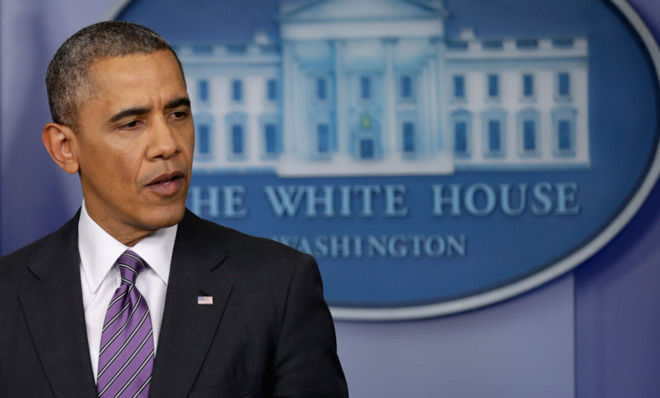Time to kill the ObamaCare employer mandate
And move beyond an outdated health-care system that relies way too heavily on employer-based insurance


A free daily email with the biggest news stories of the day – and the best features from TheWeek.com
You are now subscribed
Your newsletter sign-up was successful
Sylvia Matthews Burwell cruised through her first confirmation hearing last week, with little stopping her from becoming the next secretary of Health and Human Services. One noteworthy moment, however, came when Sen. Pat Roberts (R-Kan.) asked Burwell about ObamaCare's employer mandate, which has been delayed twice now. Comparing it to the individual mandate, Roberts asked, "Do you think it's fair to give business a delay but not individual Americans?"
This was the same question that tripped up Kathleen Sebelius in her disastrous interview with Jon Stewart during HealthCare.gov's botched rollout in October 2013. Burwell had a ready answer where her predecessor had none, replying that Americans can seek relief from the individual mandate through hardship exemptions, but the point remains.
What Burwell and Sebelius failed to acknowledge is that the employer mandate is extraneous to ObamaCare's insurance market reforms, while the individual mandate is essential to ensure the system doesn't collapse under the weight of new enrollees who are sicker and older. The administration's dirty little secret, in other words, is that the employer mandate just isn't that important.
The Week
Escape your echo chamber. Get the facts behind the news, plus analysis from multiple perspectives.

Sign up for The Week's Free Newsletters
From our morning news briefing to a weekly Good News Newsletter, get the best of The Week delivered directly to your inbox.
From our morning news briefing to a weekly Good News Newsletter, get the best of The Week delivered directly to your inbox.
And opponents of the mandate got some new ammunition last week, in the form of a paper from researchers at the Urban Institute. The left-leaning policy organization said that the employer mandate shouldn't merely be delayed, it should be killed altogether.
The employer mandate imposes a penalty on firms with more than 50 employees working at least 30 hours per week, if the firm fails to provide adequate and affordable health insurance. The researchers found that killing it would cause little decline in the number of Americans with health insurance, but would alleviate some troubling distortions in the labor market. The mandate creates bad incentives for employers to avoid hiring a 50th worker. It might also lead to some employees being capped at 29 hours per week.
Low-wage workers are particularly vulnerable. The Center on Budget and Policy Priorities notes that the structure of the penalty creates a disincentive against hiring low- and middle-income workers who would be eligible for health-exchange subsidies. This is because the penalty for not offering health insurance is based on the number of employees that receive subsidies to purchase insurance on exchanges.
Indeed, according to the Urban Institute, many of these workers may gain more from expanded Medicaid eligibility or from marketplace subsidies than from insurance provided by their employers.
A free daily email with the biggest news stories of the day – and the best features from TheWeek.com
The gains from the employer mandate are comparatively sparse. A senior Obama administration official made the case for the mandate to The Wall Street Journal: It's a $46 billion revenue stream; it saves taxpayers money by keeping workers off publicly subsidized insurance plans; and it "levels the playing field" between employers by weakening the competitive advantage that comes from not providing health insurance.
Confronting the merits of the employer mandate, however, means confronting the broader direction of our health-insurance system. Are we doubling down on an employer-based system, or are we moving beyond it? ObamaCare grafts a universal health-care scheme onto a private, employer-centric system. But it also loosens the grip of employers in significant ways, such as by reducing job lock, which keeps people stuck in jobs for insurance reasons, and by rejuvenating the individual market.
If anything, we should be encouraging the migration of people to the individual market, where health insurance is no longer dependent on job security and where they can buy their own insurance with the aid of government subsidies.
Including an employer mandate in ObamaCare was more about political expedience than well-conceived policy. It was meant to protect against postreform disruption for the vast majority of Americans who are content with their employer-provided care. It was also an important way for ObamaCare to keep the support of labor groups.
Much of our discourse about the employer mandate is driven by a sense that it just feels wrong to impose insurance mandates on individuals without a corresponding mandate on employers. But the mandate entrenches an outmoded employer-centered system and burdens our most vulnerable workers for little appreciable gain.
The Obama administration therefore must come clean: It's time to kill the employer mandate.
Joel Dodge writes about politics, law, and domestic policy for The Week and at his blog. He is a member of the Boston University School of Law's class of 2014.
-
 How the FCC’s ‘equal time’ rule works
How the FCC’s ‘equal time’ rule worksIn the Spotlight The law is at the heart of the Colbert-CBS conflict
-
 What is the endgame in the DHS shutdown?
What is the endgame in the DHS shutdown?Today’s Big Question Democrats want to rein in ICE’s immigration crackdown
-
 ‘Poor time management isn’t just an inconvenience’
‘Poor time management isn’t just an inconvenience’Instant Opinion Opinion, comment and editorials of the day
